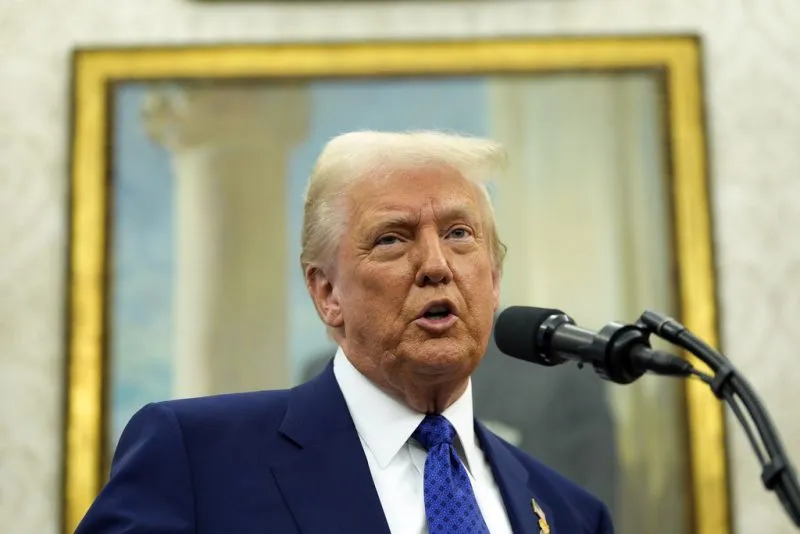Market Volatility Surges as Investors React to Trump's Trade Policies

February 27, 2025
President Donald Trump's trade policies have long been a topic of heated debate. With the introduction of new tariffs targeting various industries, the financial world is experiencing unprecedented volatility. This article explores the broader economic consequences, how markets are reacting, and the potential long-term impacts.
Understanding the Tariffs: What’s New?Trump’s latest tariffs aim to pressure foreign competitors, particularly China, to level the playing field for American manufacturers. These include:
Increased tariffs on steel and aluminum imports
Higher duties on Chinese electronics and machinery
New levies on European automotive imports
Targeted tariffs on agricultural products
The administration claims these measures are designed to protect American jobs, but economists warn of unintended consequences.
Market Volatility and Investor Reactions Stock Market TurmoilMarkets have responded with sharp fluctuations. The S&P 500, Dow Jones, and NASDAQ have seen increased volatility as investors adjust their portfolios to hedge against potential losses.
Bond Market and Safe-Haven AssetsWith uncertainty rising, many investors are shifting capital into bonds, gold, and other safe-haven assets. The 10-year Treasury yield has dropped, reflecting investor concern over long-term economic growth.
Impact on Key Sectors Manufacturing and TradeWhile some domestic manufacturers may benefit, those reliant on imported raw materials are facing rising costs. Companies like Boeing and GM have expressed concerns about supply chain disruptions.
Technology and Consumer GoodsThe increased tariffs on Chinese imports have placed tech companies in a difficult position. Rising costs for semiconductors and hardware are expected to lead to higher consumer prices.
Agriculture and Food IndustryFarmers have been hit hard, with China and other trade partners retaliating by imposing tariffs on American agricultural products. Soybean, pork, and dairy farmers face declining exports and revenue losses.
Global Trade Relations and Diplomatic StrainTrump’s tariffs have strained relations with key trading partners, leading to:
Retaliatory tariffs from China, the EU, and Canada
Disruptions in US-Mexico-Canada Agreement (USMCA) trade flows
Diplomatic negotiations with the WTO over tariff disputes
Economic experts are divided on whether these tariffs will lead to renegotiated trade deals or prolonged economic instability. Some argue that they provide leverage for the US in negotiations, while others warn of potential recessionary effects.
Final Thoughts: What’s Next for Investors?As trade tensions escalate, investors must remain cautious. Diversifying portfolios, monitoring emerging markets, and staying informed on policy changes will be crucial in navigating this volatile economic landscape.

Stock Market Gains as Interest Rates Drop
As interest rates fall, investors are finding new stock opportunities. Experts suggest this trend could drive market growth in key sectors

How U.S. Investment Policies Are Evolving in 2024 and Beyond
U.S. investment policies are undergoing major changes, impacting businesses, investors, and financial markets. Learn about key updates shaping the future of investments.

The Influence of U.S. Government Regulations on Investment Strategies
U.S. government regulations significantly shape investment strategies. This article explores how recent changes in policy impact businesses, investors, and financial markets

How U.S. Policy Shifts Influence Investment Approaches
U.S. investment strategies must evolve as government policies shift. This article explores how investors can adapt to changes in regulations and market conditions.

How Regulatory Evasion is Shaping Modern Investment Strategies
As companies and financial markets increasingly challenge regulations, investors must adapt to new risks and opportunities in this evolving economic landscape

How U.S. Tax Laws Influence Investment Strategies
U.S. tax laws play a crucial role in shaping investment decisions. This article explores how changes in tax policies impact investor behavior, asset allocation, and financial outcomes.

How U.S. Investment Regulations Influence Stock Market Movements
U.S. investment regulations play a crucial role in shaping stock market trends. This article explores the impact of regulatory changes on investor behavior, market volatility, and long-term market outlook

Market Strength, Innovation, and Growth Drive U.S. Stocks
U.S. equities continue to outperform, driven by strong earnings, economic resilience, and innovation. Investors remain bullish on long-term market growth

Strategic Equity Insights for Navigating Market Volatility
The stock market remains uncertain amid economic shifts. Systematic equity strategies provide a data-driven approach to managing risk and optimizing returns
The Atlantic Daily
Get our guide to the day’s biggest news and ideas, delivered to your inbox every weekday and Sunday mornings. See more newsletters
.webp)
Ideas That Matter
Subscribe and support more than 160 years of independent journalism.
Subscribe